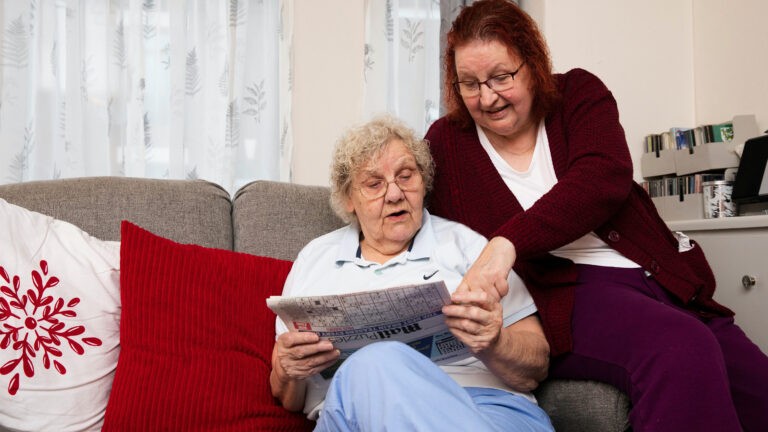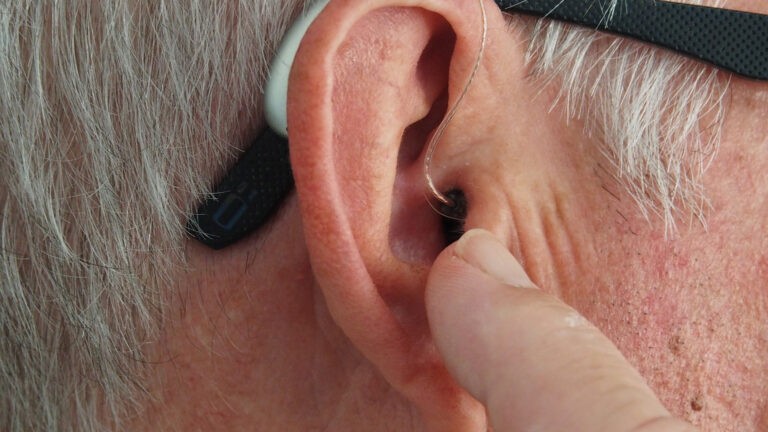The risk of dementia increases with untreated hearing loss.
Dementia and hearing loss often occur as we age, but the connection is deeper than that.i Recent studies have shown that hearing care and hearing aids may have an important role to play in the prevention of dementia.

What’s the link between hearing loss and dementia?
The link between hearing loss and dementia made headlines in 2017. An important analysis of dementia studies found that people with hearing loss in middle age were more likely to develop dementia later in life. The risk was greater for people with more severe hearing loss.
The report explained that up to a third of dementia cases could be prevented with lifestyle changes, such as stopping smoking and doing exercise. Of these changes, preventing and treating hearing loss is thought to be the most important.
How much do we know about hearing loss and dementia?
There are several theories about why dementia and hearing loss often seem to happen together. One possibility is that hearing loss does not lead to dementia, but they share a common cause.
Older people with hearing loss are more likely to experience social isolation and depression. They often avoid going out, missing out on opportunities to learn and socialise.iv The reduced stimulation to the brain could speed up the development of dementia symptoms.
Scientists are trying to understand why older people with hearing loss have different brain scans compared to those with good hearing. The effort of listening with a hearing loss may be the reason. When the brain is busy working out what has been said, less energy is available to other parts of the brain, including the memory.

Hearing aids have a key role to play.
Studies have shown that people who use hearing aids when they need them do not have an increased risk of dementia. We don’t yet understand whether hearing aids prevent dementia from starting or whether they help by slowing dementia symptoms when they begin.
Hearing well with hearing aids can make social situations more enjoyable and less tiring. This stimulation may protect the brain against dementia directly, or may help indirectly through improved mental health.
If you are not sure whether you would benefit from hearing aids, a hearing test is the best way to find out. Deciding to have hearing aids is a personal choice. People tend to get on best with hearing aids when they want to have them and feel that they need them.
The impact of dementia on hearing
Dementia can alter the way a person picks up information from their senses. They may misjudge or misinterpret what they are seeing, for example seeing a dark floor mat as a hole. It can also affect how they hear, making it more difficult to work out what is being said in background noise or when they cannot hear all of the words.
A person with dementia may have trouble finding the right words, and may need time to think during a conversation. During those moments, they will not hear you because they are busy with their own thoughts.
Caring for the hearing needs of a person with dementia
The symptoms of hearing loss and dementia can look similar. A hearing test is not always included in dementia testing, even though it can affect the result, so it is important to ask for a hearing test for anyone who is being tested for dementia.
A person with dementia may not realise that they have a hearing loss and may not be able to tell you if their hearing becomes a problem. You can help by arranging for them to have their ears and hearing checked around every two years, or sooner if there are concerns.
When caring for someone with dementia and hearing loss, it is important to help them hear you. Make sure that they can see you when you speak and turn off background noises. Speak clearly, without shouting or exaggerating. If they use a hearing aid, help them to look after it and use it daily.
Further support

Royal National Institute for Deaf People
The RNID website has the latest hearing research news and communication tips.
The Alzheimer’s Society
The Alzheimer’s Society is there to support people living with dementia

